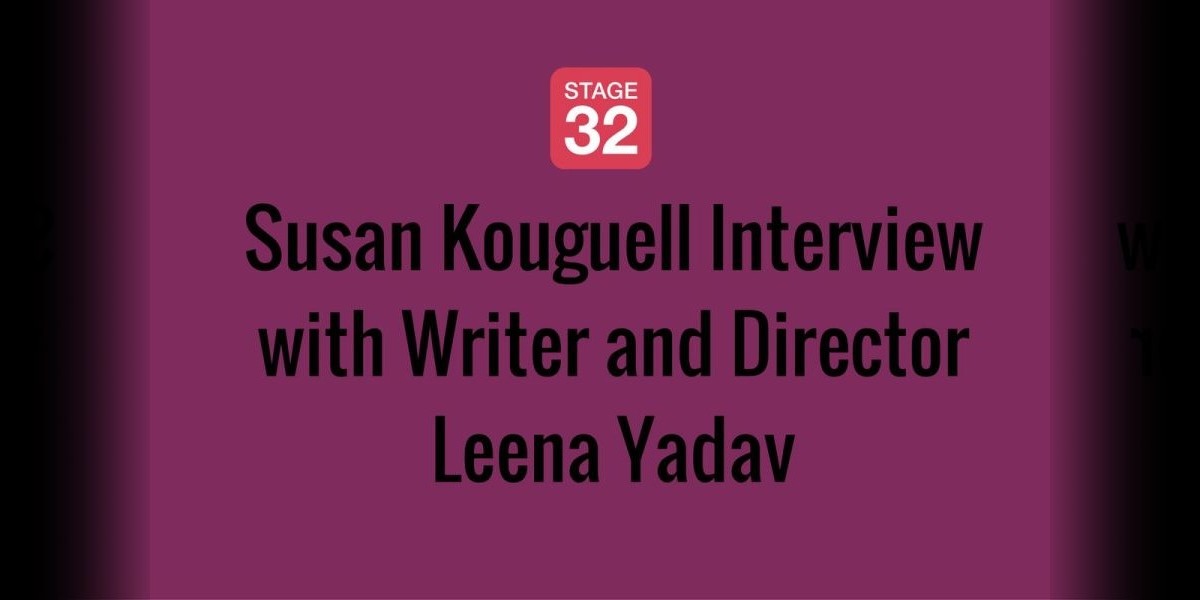Susan Kouguell Interview with Writer and Director Leena Yadav
Recently I had the great pleasure to interview writer and director Leena Yadav by phone. In our no holds barred conversation, we covered not only the challenging themes of this film, including conditioning and gender roles, patriarchy, and abuse, but also the challenges of raising money (just over 2.5 million) for this -- as Yadav stated, -- “absolutely independent” film.
Thought-provoking and honest, ‘Parched’ tackles these tough and timely topics unapologetically. The cinematography (shot by Academy Award-winning cinematographer Russell Carpenter (‘Titanic’) adds another layer of both beauty and painful depth to the rich characters and desert landscape.
“I was raised to judge and treat people as human beings above and beyond their gender, religion or caste.”
--Writer/Director ‘Parched’ Leena Yadav
photo by Russell Carpenter ASC - Courtesy of W.J
‘Parched’
An evocative drama, ‘Parched’ follows the lives of three Indian women who question the ancient traditions that hold them in servitude. Set in a remote rural desert community of North West India -- widowed Rani, her vivacious best friend, Lajjo, and the exotic dancer Bijli -- talk about men, sex and life, as they struggle under the oppressive rules of their traditional village ways.
But when Rani is tasked to find a teenage bride for her entitled fifteen-year-old son, they begin to question this status quo that favors men, sends child brides to abusive husbands, and ostracizes women for being educated and opinionated. One fateful night, the women come together and take a bold step that will change the trajectory of their lives forever.
The story is set in Ujhaas, a fictional village. Yadav: “For the film, we invented a new dialect (for the villagers) that mixes Hindi with the local language, Kutchi.”
Photo courtesy of Wolfe Video
About Writer/Director Leena Yadav
Born in Mhow, India, Leena Yadav is one of a vanguard of prominent female directors working in India. She began her career as a successful editor on commercials and an assistant director for television, and then went on to direct for more than 300 hours of television, including hit fiction shows and India's first reality TV show. She made her directorial debut with ‘Shabd’ (2005), which she also wrote and edited -- and which bravely explores the psychology of love, marriage, creativity and freedom. She wrote and directed ‘Teen Patti’ (2010), starring two legends of cinema --Amitabh Bachchan and Academy Award Winner, Sir Ben Kingsley. ‘Parched’ (2015), Yadav’s third feature film, world premiered at the 2015 Toronto International Film Festival, and has garnered awards and critical acclaim at numerous festivals worldwide, including the Stockholm International Film Festival (received the first ever Impact Award to “support[s] headstrong filmmakers who are not afraid to bring up burning topics in contemporary society” judged, designed and presented by the legend Ai Weiwei); Best of the Fest at the Palm Springs International Film Festival; Festival 2 Valenciennes (France): Prix du Jury for Best Film and Best Actress; Toulouse Indian Film Festival: Audience Award for best film; IFFLA 2016: Audience Award for Best Film and Best Actress; and Festival de Cinema des 5 Continents, Ferney France: Youth Jury Award for Best Film and Special Jury Mention.
Poster - PARCHED - courtesy of Wolfe Video
Release Platforms
‘Parched’ opens theatrically via Wolfe Releasing on June 17th in Los Angeles (Laemmle Music Hall), New York (AMC Empire 25) and the Bay Area (Cine Grand in Fremont and Camera 12 in San Jose). The film will be released via Wolfe Video on August 9th on DVD/ VOD, across all digital platforms, including iTunes, Vimeo On Demand, and WolfeOnDemand.com, and will also be available same date on DVD via Wolfe Video and many major retailers.
The film is currently playing in France in its seventh week as 'La Saison Des Femmes', in Mexico as 'Corazones Encontrados' and in Belgium. Upcoming film festivals include Seoul International Women's Festival (New Currents section), Edinburgh International Film Festival, London Indian Film Festival, and Asia Pacific Screen Awards.
The Evolution of the Screenplay
Yadav: “While I was writing the screenplay I was suddenly struck with the idea that what I'm writing about is happening right here in my backyard in Bombay. Everyone wants to believe that these problems and these kinds of judgments are happening elsewhere. We like to live in denial. The script process became so interesting for me when I was writing in Bombay and I sent it out to my friends across the world just to get feedback. No one reacted to it like a script; they all wrote back, sharing stories about their own circumstances. We all started feeling the universality of the subject.
The writing process continued when I went location scouting for villages. We visited over 30 villages in and around Bhuj, Gujarat and Rajasthan. I was refused permission from a lot of villagers because people were saying, if women like you are here than our women will become corrupt, looking at you, seeing a woman who is empowered, who is in charge of herself. They did not approve of a team led by a woman (myself) who wore pants, didn’t cover her head and spoke openly to men. That gave me more juice (ideas) again and I came back home and I wrote more.
It was interesting with the younger generation of men in the villages --- the current decision- makers, who had the biggest problem with a liberated woman team leader. One said to me, “If women like you enter our village, our women will get corrupted.” From this experience I got the character of Gulab, Rani’s son. Gulab has been raised in a patriarchal world, where misogyny is the ‘norm’. He is as much a product of this world as he becomes its propagator. In that sense, Gulab too is a victim. The men who are his elders have bequeathed to him anger and aggression as survival tools. He has been raised believing that women are objects of lust and possession.
Photo by Russell Carpnter, ASC - courtesy of Wolfe Video
The Controversial Ending of the Film
We discussed the controversial climax of the film and agreed not to give any details away in this interview.
Yadav stated: “When I was working on the script and I thought: What is the big revelation that can happen? What is the big change? The answer for me was very simple. Each character would be questioning her circumstances. For me, that was the big resolution; their rebellion.”
The small steps -- that is what I always tell the audience. If a few people can start questioning their conditioning -- like falling into the traps of boys don’t cry, girls don’t do this or that -- then we can stop being so accepting of this conditioning.
We give so much lip service to so many things. The whole thing with patriarchy is confusing because some of the greatest supporters of the patriarchy are women. The moment we get engaged in the gender blame game, we're not going anywhere. We have to sit down together and talk this out.
The victims here in this film are also men because of their conditioning. You can see their anger whether it’s a man’s confused sexuality or an impotent husband unable to have children. Anger comes from all kinds of suppression.”
Getting the Movie Made
“Where I come from, it’s very Bollywood-driven and if it's not, then it's very star-driven or it's very male-driven. I was told, ‘You don't have any guys in the film, why don't you at least get us known women actors like the big stars?” That's when superstar actor Ajay Devgn gave us seed money and came on board as a producer. He said, ‘I support your film; you can use my name to get financing.’ He worked a lot with my husband, Aseem Baja, who is a cinematographer, and also a producer of this film; he has been the backbone of ‘Parched’. This is really a passion project.”
On Working with Oscar-Winning Cinematographer Russell Carpenter
“Russell has an amazing eye for detail. I love the way he uses light and shade in every frame. A director – cinematographer relationship on shoots is almost like a husband wife relationship – high expectations and low tolerance!”
Final Words
“This film is my reaction to a misogynistic society that treats women as objects of sex, where their greatest role is to serve men. Giving my women characters a voice that observes, absorbs and reacts was what drove me to write this drama about ordinary women who are driven to extraordinary ends.”
About Susan Kouguell, contributor for SydneysBuzz
Award-winning screenwriter and filmmaker Susan Kouguell serves as chairperson of Su-City Pictures East, LLC - a motion picture consulting company where she works with international filmmakers and studios. She writes about film and screenwriting for SydneysBuzz,Script Magazine, and other publications. Kouguell teaches screenwriting at Purchase College, SUNY, and presents international seminars. Her films are in the Museum of Modern Art's permanent collection and archives, were included in the Whitney Museum Biennial and screened in many festivals worldwide.
Like this blog post? Please share it on social media (Facebook, Twitter, LinkedIn, email etc) by using social media buttons at the top of the blog. Or post to your personal blog and anywhere else you feel appropriate. Thank you.
As always, we welcome thoughts and remarks on ANY of the content above in the Comments section below...
| Stage 32 Profile Pages - Updated & Upgraded! |
| BECOME A LOCATION SCOUTING PRO - Five Scouting Tips for Filmmakers |
Search Stage 32 Blog
There are now 4044 blog posts for you to enjoy. Search them all by tags below.
Acting, Advice, Cinematography, Coffee & Content, Composing, Contests, Distribution, Featured, Filmmaking, Financing, Inspirational, Networking, Producing, Screenwriting, Success Stories, Tips, Trending,Relevant Tags
Recommended Articles

Green Lights and Grey Areas: Expanding Creative Collaboration in Publishing

A Practical Guide for Actors: Tips & Advice Every Performer Should Know

Stage 32 Featured at the 43rd Torino Film Festival!

Coffee & Content: Low Stakes Stories, High Stakes Decisions

Coffee & Content: The Genius of Weapons and How to Know When Your Script Is Ready

State of the Industry 2026 Now On-Demand: RB & Geoff Break Down What’s Next for Writers!

Happy Thanksgiving From Stage 32: We Are Thankful For YOU

Stage 32 Now Certifying the Dallas Film Commission!

Making Our First No-Budget Feature: The Pure Vortex Production Chaos (Part 2)






